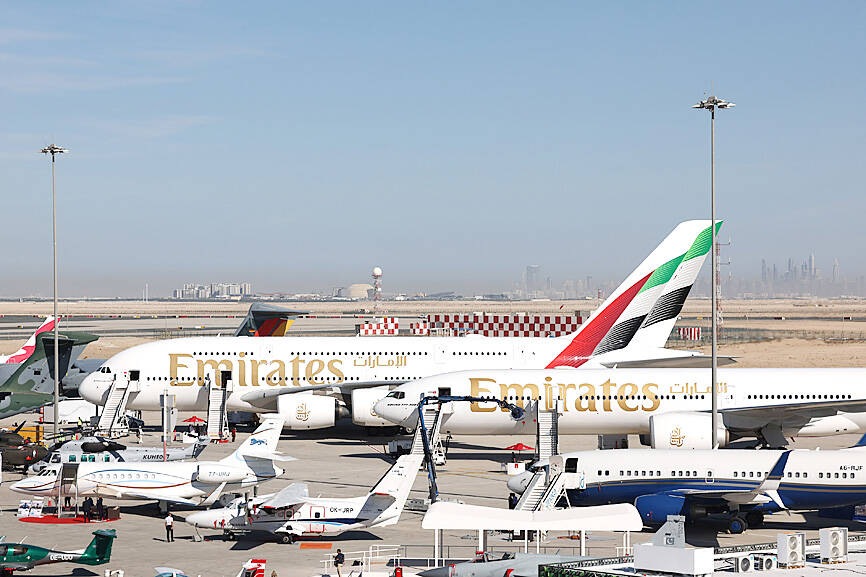The biennial Dubai Air Show opened yesterday with airlines poised to make major aircraft purchases after rebounding from the groundings of the COVID-19 pandemic, even as Israel’s war with Hamas clouds regional security.
That conflict, as well as Russia’s war on Ukraine, are likely to influence the five-day show at Al Maktoum International Airport at Dubai World Central. It is the city-state’s second airfield after Dubai International Airport, the world’s busiest for international travel and the home base for the long-haul carrier Emirates.
While commercial aviation takes much of the attention, arms manufacturers also have exhibitions at the show. Two major Israeli firms — Rafael Advanced Defense Systems Ltd and Israel Aerospace Industries Ltd (IAI) had been slated to participate.

Photo: Bloomberg
However, the IAI stand, bearing the slogan “Where Courage Meets Technology,” was roped off and empty yesterday morning as people poured into the show.
A stand for Rafael handed out coffee, although there were no salespeople. The company also sponsored a meeting of air force commanders yesterday at a luxury Dubai hotel, highlighting the balancing act being struck by the United Arab Emirates (UAE) amid anger in the Arab world over the Israel-Hamas war.
The UAE, a federation of seven sheikhdoms, established diplomatic relations with Israel in 2020.
The firm Russian Helicopters has staff on hand after attending the Abu Dhabi arms fair earlier this year, despite being sanctioned over Moscow’s invasion of Ukraine. ROSCOSMOS, the Russian state space company, is also at the show.
Global aviation is booming after the COVID-19 pandemic saw worldwide lockdowns and aircraft grounded, particularly at Al Maktoum Airport, which served for months as a parking lot for Emirates’ double-decker Airbus SE 380s.
Air traffic is now at 97 percent of pre-COVID-19 levels, the International Air Transport Association (IATA) said. Middle Eastern airlines, which fly key east-west routes, saw a 26.6 percent increase in September traffic compared with a year earlier, IATA said.
Boeing is closing in on a major order for its 777X wide-body model from Emirates, people familiar with the discussions said, in what would provide an important boost to a program that is years behind schedule.
Already the biggest buyer of the 777X, Emirates is poised to make a high double-digit order of the aircraft, it said. As part of the deal, regional affiliate FlyDubai could take some of Emirate’s 787 Dreamliner earmarked orders, the company said.
EgyptAir is also set to receive 18 Boeing 737 Max 8 aircraft, adding more narrow-body jets to the state-owned airline’s fleet, people familiar with the matter said. The airline is to receive the aircraft between 2025 and 2026, a company spokesperson said.
Turkish Airlines might also make a record-shattering purchase of 355 Airbus aircraft, including 250 A321neo aircraft, state-run Anadolu news agency said.
Additional reporting by Bloomberg

DIVIDED VIEWS: Although the Fed agreed on holding rates steady, some officials see no rate cuts for this year, while 10 policymakers foresee two or more cuts There are a lot of unknowns about the outlook for the economy and interest rates, but US Federal Reserve Chair Jerome Powell signaled at least one thing seems certain: Higher prices are coming. Fed policymakers voted unanimously to hold interest rates steady at a range of 4.25 percent to 4.50 percent for a fourth straight meeting on Wednesday, as they await clarity on whether tariffs would leave a one-time or more lasting mark on inflation. Powell said it is still unclear how much of the bill would fall on the shoulders of consumers, but he expects to learn more about tariffs

NOT JUSTIFIED: The bank’s governor said there would only be a rate cut if inflation falls below 1.5% and economic conditions deteriorate, which have not been detected The central bank yesterday kept its key interest rates unchanged for a fifth consecutive quarter, aligning with market expectations, while slightly lowering its inflation outlook amid signs of cooling price pressures. The move came after the US Federal Reserve held rates steady overnight, despite pressure from US President Donald Trump to cut borrowing costs. Central bank board members unanimously voted to maintain the discount rate at 2 percent, the secured loan rate at 2.375 percent and the overnight lending rate at 4.25 percent. “We consider the policy decision appropriate, although it suggests tightening leaning after factoring in slackening inflation and stable GDP growth,”

Meta Platforms Inc offered US$100 million bonuses to OpenAI employees in an unsuccessful bid to poach the ChatGPT maker’s talent and strengthen its own generative artificial intelligence (AI) teams, OpenAI CEO Sam Altman has said. Facebook’s parent company — a competitor of OpenAI — also offered “giant” annual salaries exceeding US$100 million to OpenAI staffers, Altman said in an interview on the Uncapped with Jack Altman podcast released on Tuesday. “It is crazy,” Sam Altman told his brother Jack in the interview. “I’m really happy that at least so far none of our best people have decided to take them

As they zigzagged from one machine to another in the searing African sun, the workers were covered in black soot. However, the charcoal they were making is known as “green,” and backers hope it can save impoverished Chad from rampant deforestation. Chad, a vast, landlocked country of 19 million people perched at the crossroads of north and central Africa, is steadily turning to desert. It has lost more than 90 percent of its forest cover since the 1970s, hit by climate change and overexploitation of trees for household uses such as cooking, officials say. “Green charcoal” aims to protect what